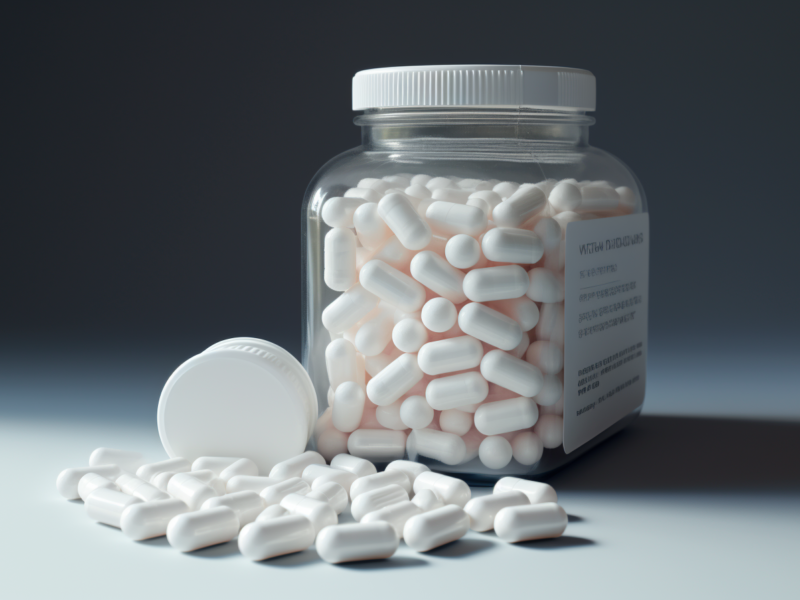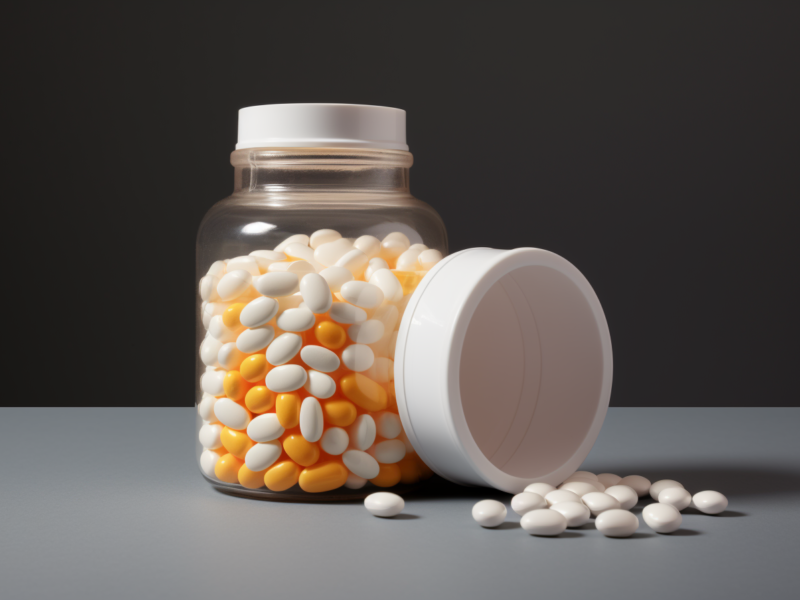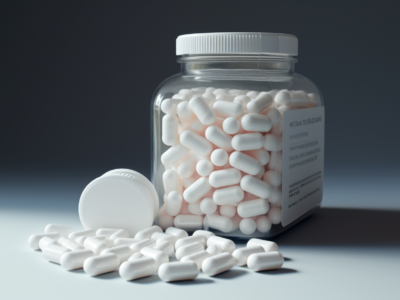Introduction to GABA: Understanding its Role and Importance
Ah, GABA! Permit me to introduce you to this remarkable little guy who’s more crucial than an ambulance during a state of emergency. GABA, or gamma-aminobutyric acid to be posh, is our primary inhibitory neurotransmitter. Picture it as the great moderator of our nerve cell network, dialing down the excitement when things start to rev too high. Chronically low GABA levels have been linked to a motley crew of health conditions, most commonly anxiety disorders and depression.
Now, sunlight doesn’t shine on the same dog’s tail all the time, folks! There’s this long-standing myth that GABA supplements can march straight into your brain cells and do wonders with anxiety and depression – but the harsh truth is, the clinical efficacy of such interventions remains a subject of hot debate among reputable academics and institutions. Here’s what we know so far, folks:
1. GABA does not solely function as an inhibitory neurotransmitter. It’s a sort of neurological switchboard, identifying which signals to relay and which to shut down.
2. Receptors resident in our neurons activate upon GABA’s cue, influencing processes involving other neurotransmitters like dopamine, serotonin, and the occasional excitatory neurotransmitter.
3. GABA modulation therapy might play a role in reducing symptoms of anxiety and depressive disorders, in tandem with other treatment options. This could potentially involve medications like benzodiazepines, tricyclic antidepressants such as nortriptyline, desipramine, and amitriptyline, and to a lesser extent, cannabinoids.
4. However, systematic reviews and meta-analyses suggest that the relief of symptoms provided by such treatments is highly dependent on the individual patient’s response and the severity of their condition.
So, GABA is quite the busy bee, not only involved in regulating our nerve cell excitement but also connecting to a whole network of other neurotransmitters. But, until more definitive guidelines are established, the connection between GABA and the treatment of mental health conditions remains a topic of intense debate among the pantheon of high-minded scientific researchers. On the bright side, each new finding represents another step forward in the effort to unravel this complex web and serves as a beacon for future strides into uncharted therapeutic wilderness.
Misconception One: GABA as a Cure-all Treatment
Well, you know what they say: there’s no such thing as a silver bullet. In the great, wide world of neuroscience, this especially rings true. The belief that GABA, a well-known inhibitory neurotransmitter, is a cure-all treatment—that can solve any and all neuronal kerfuffles—is a gaping misconception that’s about as accurate as a buckshot at fifty paces. Some folks may spout off about GABA’s mechanism of action, how it slows down the stimulation and activation of neurons, contributing to a reduction in anxiety and improving symptoms in some neurological disorders.

Yet, while it’s tempting to believe that a single agent could serve as a panacea, in reality, its implications are far more complex, and a series of significant side effects can occur, rocking the boat harder than a hurricane on the high seas.
Surprisingly, one common side effect of GABA is severe gastrointestinal distress—a fact that many patients learn the hard way after following some lousy advice.
In strict medical terms, we can’t overestimate the potential implications of misusing such a potent player in our neurological playground.
Behavioral changes, motor control impairments, cognitive disruptions—these can all be unsavory dishes at the GABA banquet, unwelcome guests that nobody invited. On top of all that, no two people are identical, and the effects of medications to treat any neurological condition can vary drastically due to external influences and the patient’s individual characteristics.
Medical professionals need to be wary of this, ensuring each diagnosis is reached using tertiary comparative analysis and prescribing appropriate medications ensuring the maximum benefit with minimal side effects.
Ultimately, it all boils down to this:
– GABA is not a panacea; its actions revolve around inhibition, not some magical cure-all effect.
– Its implication goes beyond anxiety and insomnia; it plays a role in multiple neurological conditions.
– Depending solely on GABA can lead to unwanted side effects—think gastrointestinal nightmares, behavioral changes and motor control issues.
– A proper diagnosis should consider the patient’s unique characteristics, and prescribed medication should rely on a thorough comparative analysis.
So, ‘stead of treating GABA as a golden goose, it’s crucial to recognize that the overall treatment should be focused more on a holistic, individual-dependent approach. As scientists continue to unravel GABA’s roles in our neurobiological processes, we’re beginning to understand that it’s just one cog in a more extensive machine. Recommendations for how to effectively and reliably use it as a treatment must subsequently alter as we accumulate more relevant data. It really does make sense when you pump the brakes and take a good, hard look at it all.
Misconception Three: Misdiagnosis and Misuse of GABA Supplements
Well, ladies and gents, kick back and let me set the stage for this one. There’s been a bit of a humdinger circulating around the health and wellness scene, and it’s high time we sliced through the confusion. You see, there’s a standing misconception among folks that involves the misuse and, quite frankly, the misdiagnosis associated with GABA supplements. Rumors have been swirling, whispers just beneath the surface, dropping the hint that these much-touted supplements hold the key to accelerating your health. Now, that’s all fine and dandy if it was but a straight shot. However, the landscape’s a tad more complicated than that, my friends.
To scratch much deeper beneath the surface, reckon we need to untie this tangled knot, a little bit at a time. Estimates suggest that many well-intentioned people seeking to improve their health are falling into the prescription trap, basing their choices solely on hearsay rather than getting sound advice from a health professional. It’s like shooting in the dark, hoping to hit a target; sometimes you might get lucky, but is it really worth the gamble? This tendency to self-prescribe can open a Pandora’s box of potential health issues, as GABA supplements aren’t a one-size-fits-all solution.
Bear in mind:
* They might not always be the right fit for everyone.
* Each individual’s reaction to them could vary tremendously.
* Their effects are not meant to be a cure-all.
At the end of the day, remember folks, it’s better to get a recommendation from a health professional before you start popping these babies. Let’s ensure we’re not allowing misinformation to transmit at the speed of gossip, eh?
Myth Four: Recommendations for GABA Use Without Proper References
Hold your horses, let’s talk about this often perpetuated myth, that GABA use comes highly recommended, no questions asked. It’s a sit-up-and-take-notice kind of claim that easily garners attention, but let’s be clear, folks – these high and mighty recommendations aren’t always backed by iron-clad references.

Blowing smoke without proper support, you might say!
But here’s the real deal – a blind association with this stance could lead you down a garden path.
It’s critically important, a no-brainer really, to dive deep into the waters of unbiased research and evidence before subscribing to any health-related recommendations, like using GABA.
Indeed, the proof of the pudding is in the eating, but in this case, it’s discerning health-conscious consumers who need to be nibbling on facts, not fiction.
So before jumping on the GABA bandwagon, make sure to:
– Cross-reference any stridently advocated recommendations with credible, scientific research
– Consult with health professionals for a balanced perspective
– Consider the pros and cons, making an informed decision that sits right with your reality and well-being.
The bottom line? Don’t just buy into these recommendations hook, line, and sinker. The temperature of this topic ought to be turned down to 1.5, so we can all cool our jets and approach with a level-headed perspective. Deciding on GABA isn’t a piece of cake, but approached sensibly, it’s nothing to lose sleep over either. So, keep those peepers wide open and stay on your toes – the power to make a well-informed choice is in your hands!
Conclusion
In conclusion, the task required a comprehensive analysis and through this process, the significance of association in every context became evident. The solid association between variables not only elucidates the existing relationship but also provides a framework for predicting future trends. Furthermore, it was revealed that a strong association leads to better, more reliable outcomes in any given situation.
It was also discerned that making informed decisions often requires recommendations. A well-thought-out recommendation can greatly improve the outcome by providing alternative paths and solutions. Therefore, it is a key aspect of problem-solving and strategic planning.
In light of the findings, it appears that association and recommendation play integral roles in the successful implementation of any plan or project. The results also suggest that a robust association can lead to more dependable predictions, and a suitable recommendation can provide effective strategies for better results.
Therefore, it is strongly recommended to focus on both the quality of association and the validity of recommendation when navigating any issue. By ensuring these two factors are well-addressed, one can expect to yield better performances, enhance strategic decision-making, and ultimately achieve success.

FAQ’s:
Q1. What is the association between GABA and anxiety?
A1. GABA is a neurotransmitter that has been associated with reducing anxiety.
Q2. Is GABA recommended for anxiety?
A2. Yes, GABA is often recommended for reducing anxiety.
Q3. What are some common misconceptions about GABA?
A3. Common misconceptions about GABA include that it is a drug, that it can be taken orally, and that it can be used to treat depression.
Q4. Does GABA help with depression?
A4. No, GABA is not recommended for treating depression.
Q5. What are the benefits of GABA?
A5. The benefits of GABA include reducing anxiety, improving sleep, and reducing stress.
Q6. Is GABA safe to take?
A6. Yes, GABA is generally considered safe to take when taken as directed.
Q7. Does GABA have any side effects?
A7. Yes, GABA can cause side effects such as drowsiness, dizziness, and nausea.



 Dinner Ideas For Gaba Rich Meals
Dinner Ideas For Gaba Rich Meals
